How Did This Get Made: A Conversation With Barry P (Production Assistant, Dreamcatcher)
We may receive a commission on purchases made from links.
Typically in this space, we speak with the director, writer or producer of a film, but sometimes it can be valuable to see things from a different point of view. Especially when that point of view is such a common one in Hollywood: the perspective of an outsider—of an ambitious young filmmaker—who takes a high-pressure, entry-level job (at an agency, studio, production company, etc.) with the hopes of one day becoming an insider.
It's a tale as old as Hollywood, isn't? But this one comes with a little twist. Because when Barry P. gets a job working for one of his heroes—Lawrence Kasdan, the guy who co-wrote Empire Strikes Back! Who directed The Big Chill!!—he learns not only how the sausage is made but, more importantly, who gets to cook the sausage. And, in the process, the strange reality of how a legend like Kasdan ends up directing a very un-legendary movie like Dreamcatcher.
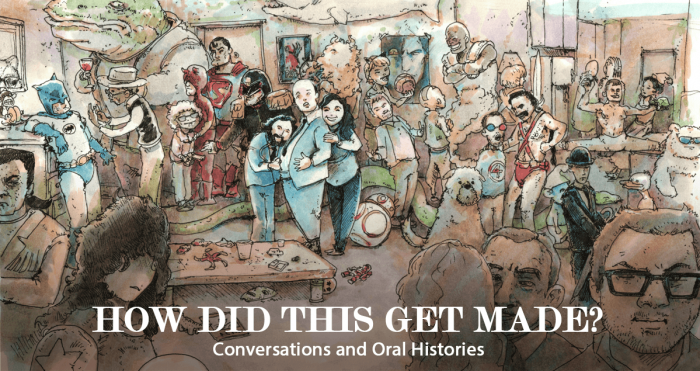 How Did This Get Made is a companion to the podcast How Did This Get Made with Paul Scheer, Jason Mantzoukas and June Diane Raphael which focuses on movies This regular feature is written by Blake J. Harris, who you might know as the writer of the book Console Wars, soon to be a motion picture produced by Seth Rogen and Evan Goldberg. You can listen to the Dreamcatcher edition of the HDTGM podcast here. Synopsis: After hanging a dreamcatcher outside of their cabin, four friends encounter a strange breed of parasitic aliens.Tagline: A circle of friendship. A web of mystery. A pattern of fear.
How Did This Get Made is a companion to the podcast How Did This Get Made with Paul Scheer, Jason Mantzoukas and June Diane Raphael which focuses on movies This regular feature is written by Blake J. Harris, who you might know as the writer of the book Console Wars, soon to be a motion picture produced by Seth Rogen and Evan Goldberg. You can listen to the Dreamcatcher edition of the HDTGM podcast here. Synopsis: After hanging a dreamcatcher outside of their cabin, four friends encounter a strange breed of parasitic aliens.Tagline: A circle of friendship. A web of mystery. A pattern of fear.
Part 1: Welcome to the Big Show
Blake J. Harris: As you know, we normally chat with directors and producers for this column, but I was really struck by your narrative—and how applicable it might be to those interested in filmmaking—that I'm glad we were able to connect.Barry P: My pleasure. I love the podcast. So when I heard you guys were doing Dreamcatcher...hoooooooo boy!Blake J. Harris: Yeah. I mean, there's so much that makes this a great HDTGM film. But perhaps nothing more interesting than the fact that it was directed by Lawrence Kasdan, and the magnitude to which it derailed his career."With Dreamcatcher, the career was hurt," Kasdan said to LA Weekly in 2012. "I was planning to do The Risk Pool with Tom Hanks [after Dreamcatcher]. I had written the script from a great book by Richard Russo. And it didn't happen. Then another one didn't happen. Meanwhile, two years have passed here, two have passed there." Blake J. Harris: But before we get into the origins of what led to that, tell me a bit about how you ended up in LA? What took you there?Barry P: Movies were always a big part of my life. I grew up loving Star Wars and then when I was in high school, Pulp Fiction came out, and I wanted to be a director. So, like a lot of people I guess, I moved to Los Angeles and went to film school.Blake J. Harris: Was film school what you expected it to be?Barry P: It was interesting. Everybody was very...it was all about commercial movies and stuff. And I got into film school thinking that's what I wanted to do. But while I was there I became more and more interested in foreign films and classic films, you know? So it became more about the art of it for me. But then getting out of school you need work, you need money, so it's all about taking whatever commercial jobs you can get. And after I graduated, I got an interview at Kasdan's office—this was right around the time he got Dreamcatcher—and I was offered a job. My first job.Blake J. Harris: And how did that happen? How did you get the job?Barry P: I knew some people who had worked for somebody else in his office and heard they were asking around for someone to come in. For an assistant position; not the assistant to Kasdan directly—he had a couple of immediate assistants—but I was basically the assistant to those assistants. [laughs] I was the gopher; the kid making coffee and running errands and stuff. I mean, getting an office job with an established filmmaker—especially someone of Larry Kasdan's caliber—it was a pretty sweet job at the time.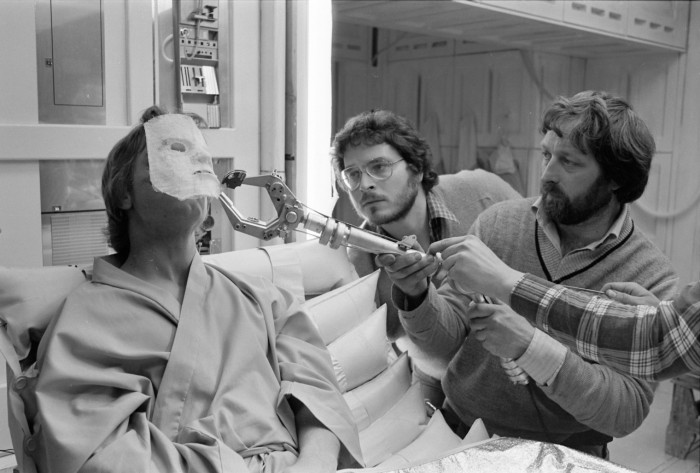 Blake J. Harris: How exciting was it for to be there because of the Star Wars connection?Barry P: It was extremely exciting. I love those movies, obviously, and Empire was the best one. So there I am, right out of school, working in a place with all these Oscar nomination plaques on the wall. It's like...the big time, you know?Blake J. Harris: And was the job what you expected? Was it enjoyable?Barry P: I don't know that it was enjoyable necessarily. Since it was my first job in the film industry, it was very much about learning the ropes and doing mundane things. Logging documents, organizing materials, helping others put out tiny fires. Stuff that's applicable to any kind of industry, really. But there's this added sort of tone to everybody doing their work and making sure you're as detailed and buttoned-up as possible because it's the big show. And there's a lot of people that want that job if you make any kind of mistake or whatever. So it's very high pressure to do super mundane kind of silly things.Blake J. Harris: What was Lawrence Kasdan like?Barry P: I really liked him. He was a great boss. A funny guy, a cool dude. And I think the new Star Wars is f***ing great. So he's still got it. But, you know, when I was there was kind of a weird time for him. In his career.In the early 80s, Kasdan wrote (or co-wrote) several classic films, including The Empire Strikes Back (1980), Raiders of the Lost Ark (1981) and Return of the Jedi (1983). As his clout increased, he added directing to his repertoire. By the early 90s—with films like Grand Canyon (1991), The Bodyguard (1992) and Wyatt Earp (1994) under his belt—Kasdan had established himself as one of the leading voices in Hollywood. Despite his track record, the next phase of his career followed a different trajectory. Over the next nine years, he only wrote and directed one movie: Mumford (1999). Barry P: So for someone like me, someone who idolized his work it was sometimes painful to watch. To see that this guy—I mean, he's a legend—and he wasn't really able to make the movies he wanted to make...sometimes it was just very painful to watch. Especially when it leads to a movie like Dreamcatcher...
Blake J. Harris: How exciting was it for to be there because of the Star Wars connection?Barry P: It was extremely exciting. I love those movies, obviously, and Empire was the best one. So there I am, right out of school, working in a place with all these Oscar nomination plaques on the wall. It's like...the big time, you know?Blake J. Harris: And was the job what you expected? Was it enjoyable?Barry P: I don't know that it was enjoyable necessarily. Since it was my first job in the film industry, it was very much about learning the ropes and doing mundane things. Logging documents, organizing materials, helping others put out tiny fires. Stuff that's applicable to any kind of industry, really. But there's this added sort of tone to everybody doing their work and making sure you're as detailed and buttoned-up as possible because it's the big show. And there's a lot of people that want that job if you make any kind of mistake or whatever. So it's very high pressure to do super mundane kind of silly things.Blake J. Harris: What was Lawrence Kasdan like?Barry P: I really liked him. He was a great boss. A funny guy, a cool dude. And I think the new Star Wars is f***ing great. So he's still got it. But, you know, when I was there was kind of a weird time for him. In his career.In the early 80s, Kasdan wrote (or co-wrote) several classic films, including The Empire Strikes Back (1980), Raiders of the Lost Ark (1981) and Return of the Jedi (1983). As his clout increased, he added directing to his repertoire. By the early 90s—with films like Grand Canyon (1991), The Bodyguard (1992) and Wyatt Earp (1994) under his belt—Kasdan had established himself as one of the leading voices in Hollywood. Despite his track record, the next phase of his career followed a different trajectory. Over the next nine years, he only wrote and directed one movie: Mumford (1999). Barry P: So for someone like me, someone who idolized his work it was sometimes painful to watch. To see that this guy—I mean, he's a legend—and he wasn't really able to make the movies he wanted to make...sometimes it was just very painful to watch. Especially when it leads to a movie like Dreamcatcher...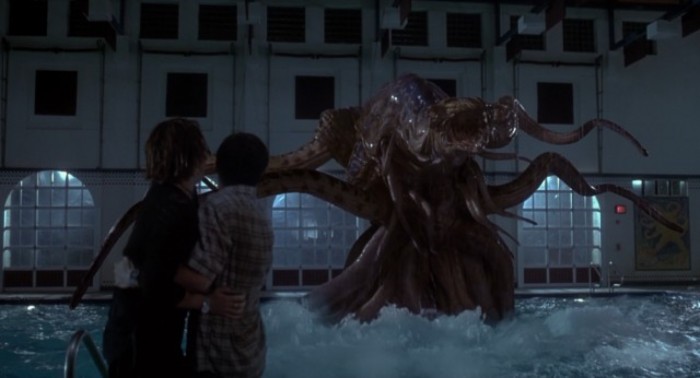
Part 2: All the Ingredients
Blake J. Harris: So...yeah...what the f***? Lawrence Kasdan directing Dreamcatcher? Barry P: [laughs] Kasdan, when I started there, he had written...I think before I got there he had written this really high-concept time-travel movie that was going to be super special effects heavy and stuff like that. And, you know, he'd been making the sort of dramedies and gabfests and stuff like that for years. So I think he was trying to get back into big popcorn stuff. So he was trying to do this time-travel movie, but I guess it was too expensive.Blake J. Harris: Right...Barry P: So he wrote this actioner cop kind of thing. I think it was going to be like $60 million, which in 99/2000 or whatever, that was a lot of money at the time. So he's trying to do this cop screenplay and that movie SWAT comes out and tanks. It's a bomb, and nobody wants to let him do basically the same kind of movie about a SWAT team or whatever. So then he...so okay, this is all through Castle Rock he was trying to do it. And Castle Rock has this handshake deal with Stephen King where, like, they can develop any of his movies for one dollar until they start shooting and then they pay him whatever millions it is, right?For several years, Stephen King has had a wonderfully unique relationship with Castle Rock Entertainment. "His standard deal," writes Mark Browning in his book Stephen King on the Big Screen, "is unique in terms of both its extent and longevity. Since the mid-1980s, he has been able to command script-, director- and cast-approval with the option of ending the project at any point."Barry P: So basically every Stephen King book is in development at Castle Rock by default. Dreamcatcher, they had apparently been doing draft after draft of it with William Goldman. And so I guess they're saying to Kasdan: well, you can't make this $60 million SWAT team movie, but we're trying to make this movie. This is going to work! This is Stephen King! This is sci-fi! This is horror. This is, like, every piece of formula is in the pipe for this, right? And so that's just kind of how this movie got made.Blake J. Harris: [laughing]Barry P: I think the thing they liked about Kasdan was that he could write it [in addition to direct] because, I guess, Goldman couldn't get exactly what they wanted. So Goldman came to the office for lunch and, I remember, I embarrassed myself because I didn't know who Spencer Tracy was and so William Goldman was disgusted with me. I also remember them talking about how Kevin Costner's career had fallen off a bit and how fickle fame was. And so anyway, Kasdan's making the movie and, at no point, does anybody just stop and go: you know, this is a really bad idea...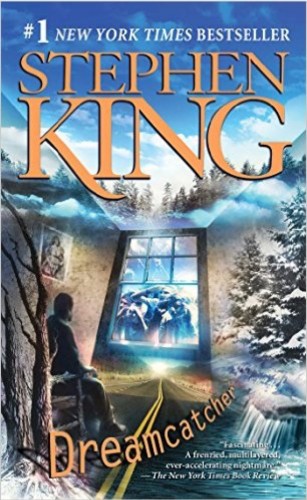 Blake J. Harris: I can't argue that. Though I should say, I've never read the Stephen King story it was based on. Had you?Barry P: So I wasn't a Stephen King fan, but I was, of course, aware of his work. I knew who he was and that his books were very popular. But even I could tell that for a Stephen King book this was not a very good one. I read the first 50 pages, and I was like: this is obviously him on whatever painkillers from his accident and he's trying to re-do It and The Shining and Stand By Me and cram 'em all together into this, like, meta Stephen King thing. And as soon as I got to the farting with the first victim or whatever... I think I had swiped the screenplay for Royal Tenenbaums from his Academy screener pile, and so I just went and did that instead of doing my work.Blake J. Harris: Obviously, this wasn't the project he was dying to make. But, by circumstance, it was the one he was making. So I'm curious if you got the sense he was phoning it in or that he was trying to make the best of whatever this was.Barry P: Great question. I think it was probably more that he was psyching himself into it. I never saw him being lazy about anything. This is the only movie that I worked on for him, so I can't really say, but he never seemed to be on autopilot or anything. He was very analytical about his decisions. He was passionate about getting it cast right and the locations. He's a professional, and he's very passionate about movie making. And I could see that once he was working and getting to do what he really wanted to do, he was in his element. The content didn't matter so much. It was just about making the best version of what he was filming. The muscle-memory and energy of doing what he loved.
Blake J. Harris: I can't argue that. Though I should say, I've never read the Stephen King story it was based on. Had you?Barry P: So I wasn't a Stephen King fan, but I was, of course, aware of his work. I knew who he was and that his books were very popular. But even I could tell that for a Stephen King book this was not a very good one. I read the first 50 pages, and I was like: this is obviously him on whatever painkillers from his accident and he's trying to re-do It and The Shining and Stand By Me and cram 'em all together into this, like, meta Stephen King thing. And as soon as I got to the farting with the first victim or whatever... I think I had swiped the screenplay for Royal Tenenbaums from his Academy screener pile, and so I just went and did that instead of doing my work.Blake J. Harris: Obviously, this wasn't the project he was dying to make. But, by circumstance, it was the one he was making. So I'm curious if you got the sense he was phoning it in or that he was trying to make the best of whatever this was.Barry P: Great question. I think it was probably more that he was psyching himself into it. I never saw him being lazy about anything. This is the only movie that I worked on for him, so I can't really say, but he never seemed to be on autopilot or anything. He was very analytical about his decisions. He was passionate about getting it cast right and the locations. He's a professional, and he's very passionate about movie making. And I could see that once he was working and getting to do what he really wanted to do, he was in his element. The content didn't matter so much. It was just about making the best version of what he was filming. The muscle-memory and energy of doing what he loved.
So, if I had to guess, I'd say his mindset was more like: if this is a piece of s***, this is my ticket back to doing bigger budget movies.
Blake J. Harris: Gotcha.Barry P: And this was when the Star Wars prequels were coming out too, right? So I don't know how much of it was about him wanting to be back into that big game.Blake J. Harris: Ah, okay.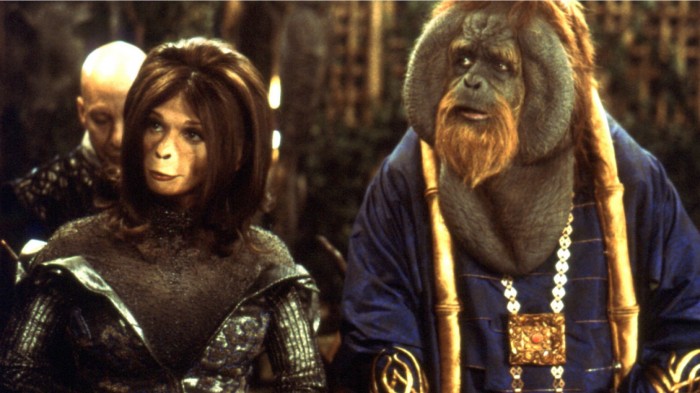 Barry P: Like I remember driving him to the Fox lot to screen the Planet of the Apes re-make (because he was considering the DP). And I remember he was just waxing nostalgic about back when he had an office on the Fox lot. I think it was when he was making Grand Canyon, and it just seemed like the memories of being at the height of his game and all this kind of stuff. So yeah, he was just sitting in mothballs until the big show came back to him.Blake J. Harris: What was the day-to-day experience like?Barry P: So, yeah, at no point did anyone really say: yeah, this is a really bad movie. Nobody should be making this. Like: who on earth is this going to entertain? Really? I don't know who the movie was made for. But the thing is, I mean, it looks great. That's the thing. There's just so much talent and craftsmanship and money that goes into these things. That, of course, there's competency to it. But there's just nothing...to, like, step back from it and say, "Yes we can do this, but should we be doing this?" And the answer is obviously no.Blake J. Harris: It's almost like there's this Ouija Board of S***Barry P: Exxxxxxxxactly! And, yeah, yeah, yeah, it's got a really great cast. But it's all in the execution. Like, remember the part with Damian Lewis? He's doing the thing where he's talking back and forth as the two characters. It's almost painful to watch. And then a year later, or whatever it was, Gollum is doing the same thing in Lord of the Rings, and it worked. I don't know exactly what that difference is...that magic that goes into it. It's probably the movie around it. But it's the exact same device, and in one movie it works great—I was almost moved to tears with the Gollum scene—and then I'm just cringing watching the one in Dreamcatcher.Blake J. Harris: Since this was your first up close and personal experience with the making of a sizeable film, were there any things that really surprised you about the process? Of seeing how the sausage was made? It could be good or bad.Barry P: It's hard for me to say really—from my perspective—because I really only had some glimpses of things. I guess one thing that stands out—and it didn't at the time, since this was my first job, but it kind of stands out looking back-was that there was very much a lack of tension in the office. Like all the jobs I've ever worked since then, offices can be tense. People can be really upset about things...but for the most part, it was just very calm. Everyone was just relaxed and going through the motions.Blake J. Harris: Interesting.Barry P: During pre-production, I remember thinking...like, I remember looking at the people that were hired to do it. And the credits these people had on their resume were like future How Did This Get Made installments: Final Fantasy. Pluto Nash. Monkey Bone. It's just like these s*** fests with gargantuan special effects money sinkholes. But here's the thing: they were amazingly talented people.Blake J. Harris: Yup.Barry P: So it's not, you know, a lack of talent, it's just how that talent is being used. And to me—as a young kid at the time—I remember being struck by the fact that their mindset wasn't "I want to make great movies" but rather "I want to make movies." Whatever the paycheck is. That's just the reality of the business.Blake J. Harris: Yeah. I mean it is art, but it's also a livelihood.Barry P: Yup. Which is something that you "know" going in, but you don't really know until you see it. And of course, at my level, you can't pick and choose. But if you make the f***ing Bodyguard and you wrote the f***ing Star Wars sequels, and you can't, like, pick and choose...it was just a huge wake-up call for a kid right out of film school to see what it was like, you know?
Barry P: Like I remember driving him to the Fox lot to screen the Planet of the Apes re-make (because he was considering the DP). And I remember he was just waxing nostalgic about back when he had an office on the Fox lot. I think it was when he was making Grand Canyon, and it just seemed like the memories of being at the height of his game and all this kind of stuff. So yeah, he was just sitting in mothballs until the big show came back to him.Blake J. Harris: What was the day-to-day experience like?Barry P: So, yeah, at no point did anyone really say: yeah, this is a really bad movie. Nobody should be making this. Like: who on earth is this going to entertain? Really? I don't know who the movie was made for. But the thing is, I mean, it looks great. That's the thing. There's just so much talent and craftsmanship and money that goes into these things. That, of course, there's competency to it. But there's just nothing...to, like, step back from it and say, "Yes we can do this, but should we be doing this?" And the answer is obviously no.Blake J. Harris: It's almost like there's this Ouija Board of S***Barry P: Exxxxxxxxactly! And, yeah, yeah, yeah, it's got a really great cast. But it's all in the execution. Like, remember the part with Damian Lewis? He's doing the thing where he's talking back and forth as the two characters. It's almost painful to watch. And then a year later, or whatever it was, Gollum is doing the same thing in Lord of the Rings, and it worked. I don't know exactly what that difference is...that magic that goes into it. It's probably the movie around it. But it's the exact same device, and in one movie it works great—I was almost moved to tears with the Gollum scene—and then I'm just cringing watching the one in Dreamcatcher.Blake J. Harris: Since this was your first up close and personal experience with the making of a sizeable film, were there any things that really surprised you about the process? Of seeing how the sausage was made? It could be good or bad.Barry P: It's hard for me to say really—from my perspective—because I really only had some glimpses of things. I guess one thing that stands out—and it didn't at the time, since this was my first job, but it kind of stands out looking back-was that there was very much a lack of tension in the office. Like all the jobs I've ever worked since then, offices can be tense. People can be really upset about things...but for the most part, it was just very calm. Everyone was just relaxed and going through the motions.Blake J. Harris: Interesting.Barry P: During pre-production, I remember thinking...like, I remember looking at the people that were hired to do it. And the credits these people had on their resume were like future How Did This Get Made installments: Final Fantasy. Pluto Nash. Monkey Bone. It's just like these s*** fests with gargantuan special effects money sinkholes. But here's the thing: they were amazingly talented people.Blake J. Harris: Yup.Barry P: So it's not, you know, a lack of talent, it's just how that talent is being used. And to me—as a young kid at the time—I remember being struck by the fact that their mindset wasn't "I want to make great movies" but rather "I want to make movies." Whatever the paycheck is. That's just the reality of the business.Blake J. Harris: Yeah. I mean it is art, but it's also a livelihood.Barry P: Yup. Which is something that you "know" going in, but you don't really know until you see it. And of course, at my level, you can't pick and choose. But if you make the f***ing Bodyguard and you wrote the f***ing Star Wars sequels, and you can't, like, pick and choose...it was just a huge wake-up call for a kid right out of film school to see what it was like, you know?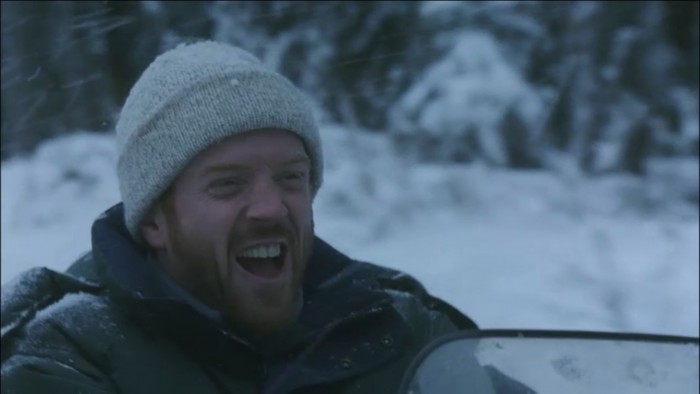
Part 3: Who Said What Now?
Blake J. Harris: Like you said earlier, this film had all the ingredients. So where there ever a point where people seemed to realize that the meal being made wasn't so tasty?Barry P: I don't know that there was ever a shift, or anything like that. I think that the majority of the people...that's the thing about it, Blake. It didn't matter whether it was going to be a turd or not. It was work. Everybody had work. The machine was up and running and, you know, paychecks were coming. The accountant's in the back doing her stuff. So what did it really matter? Obviously, some people on the crew had already been through some bad bombs before. And they're much more accepting of that. They just want to be doing the work. They don't care too much about the product. Which is sort of a dis-passion that I kind of admire now, you know?Blake J. Harris: What do you mean?Barry P: I just mean that's, like, the real-world way of looking at it. Like not needing everything to be this monumental achievement in your heart or something. It's just work, and you're going to do the best possible job of achieving the objective you are asked to accomplish. I think that mentality must be kind of helpful to persevering through a career in Hollywood.Blake J. Harris: How long did you end up working there?Barry P: I was there for about a year and a half. Like six months before it started. Six months of pre-production and then six months alone in the office where I was just holding down the fort.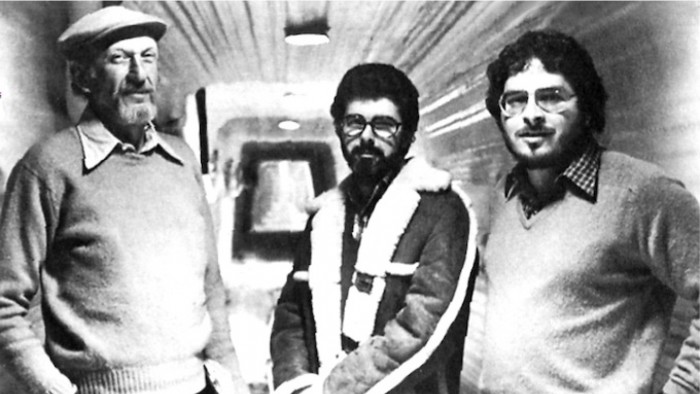 Blake J. Harris: During that time, I'm sure you were dying to ask him questions about Empire! How often—if at all—did Kasdan talk about the "good old days?"Barry P: Of course I wanted to ask him that stuff all the time! [laughs] But, you know, you try to be professional. So I never really brought it up until towards the end.Blake J. Harris: In what context?Barry P: So Larry had just flown back from the shoot in Canada, and I picked him up at the airport. I was driving him back to the office, and this was around the time that the second Star Wars prequel had just come out. Attack of the Clones had just come out. So I'm telling him how s***ty it was and he's laughing. By this point, I'd been working for him for about a year, so I'm like, "Okay, while we're on the subject, I've been wanting to ask you something a long time."Blake J. Harris: The moment of truth...Barry P: So I go, "In Empire Strikes Back, when Darth Vader turns to Boba Fett and tell him "no disintegrations," what was the backstory? Why did he have to tell him that? Give me the inside scoop!" And he sort of blinks and cocks his head and then says, "Who said what now?" And my heart just f***ing broke.Blake J. Harris: [cracking up] That reminds me of...there's this scene in that movie Fever Pitch, the one where Jimmy Fallon is a diehard Red Sox fan, and after the Sox lose a big game him and his buddies are crushed. He's wallowing away until he sees the players—the guys who had literally lost the game—are out eating dinner aren't don't seem too bothered at all.Barry P: I think that's how you survive. I think that's how you can take the losses. And maybe that's at the expense of the hits feeling so good...Blake J. Harris: Just a couple more questions. Up until now, we've mostly talked about some of the hard truths of Hollywood (and, really, just growing up). But I was wondering what's your best memory from working there? Happiest moments?Barry P: Wow, that's a tough one. Because of the movie being made, I don't know that there were any at all. I mean...I liked having a job. I liked having a paycheck. Probably the same thing that everybody at every level of the production was thinking: who cares? I'm getting paid. I'm living in Southern California, driving around in the sunshine and it's all great...Blake J. Harris: And what about worst moments? I don't necessarily mean related to the movie, but for you personally. Does anything stand out?Barry P: Hmmm....Well, this wasn't so bad as much as it was just kind of weird. But while the movie was in pre-production 9/11 happened. The morning of...everybody in Hollywood was like: f***, they're coming here next. If they're killing Wall Street, they must be even more pissed off at us; we're the much more visible one. So everybody went to the office: are we supposed to work today? So I remember it was like yeah, we all might get killed today and it's a terrible day for our country but we've got work to do so let's get cracking on Dreamcatcher!Blake J. Harris: [cracking up]Barry P: Oh! [laughing] I remember my worst moment.Blake J. Harris: Let's hear it...Barry P: So every week or two, I'd be given a list of DVDs and CDs to pick up for Larry. New movies and music to hunt down, you know? It was usually cool, kind of obscure stuff, but I remember one week I had to buy something called Cats & Dogs. It was this bulls*** movie where cats and dogs are fighting each other or whatever.Blake J. Harris: I remember that one.Barry P: Yeah, so I buy the DVD and drop it off. Then a little while later, there's this whole big thing where his assistant came out and we had a "serious conversation." Turns out I got the full-screen version of Cats & Dogs. And his assistant, I remember, she was like, "Barry, when you get Larry his DVD's, don't ever—ever, ever, ever—buy the full-screen version. Only widescreen for Larry." I mean, I like widescreen as much as the next guy but I just couldn't believe it because, one, it's a bulls*** Cats and Dogs kids movie! [laughing] Who cares about the aspect ratio?! And two—although I didn't find this out until later—they didn't even release a wide-screen version on DVD!
Blake J. Harris: During that time, I'm sure you were dying to ask him questions about Empire! How often—if at all—did Kasdan talk about the "good old days?"Barry P: Of course I wanted to ask him that stuff all the time! [laughs] But, you know, you try to be professional. So I never really brought it up until towards the end.Blake J. Harris: In what context?Barry P: So Larry had just flown back from the shoot in Canada, and I picked him up at the airport. I was driving him back to the office, and this was around the time that the second Star Wars prequel had just come out. Attack of the Clones had just come out. So I'm telling him how s***ty it was and he's laughing. By this point, I'd been working for him for about a year, so I'm like, "Okay, while we're on the subject, I've been wanting to ask you something a long time."Blake J. Harris: The moment of truth...Barry P: So I go, "In Empire Strikes Back, when Darth Vader turns to Boba Fett and tell him "no disintegrations," what was the backstory? Why did he have to tell him that? Give me the inside scoop!" And he sort of blinks and cocks his head and then says, "Who said what now?" And my heart just f***ing broke.Blake J. Harris: [cracking up] That reminds me of...there's this scene in that movie Fever Pitch, the one where Jimmy Fallon is a diehard Red Sox fan, and after the Sox lose a big game him and his buddies are crushed. He's wallowing away until he sees the players—the guys who had literally lost the game—are out eating dinner aren't don't seem too bothered at all.Barry P: I think that's how you survive. I think that's how you can take the losses. And maybe that's at the expense of the hits feeling so good...Blake J. Harris: Just a couple more questions. Up until now, we've mostly talked about some of the hard truths of Hollywood (and, really, just growing up). But I was wondering what's your best memory from working there? Happiest moments?Barry P: Wow, that's a tough one. Because of the movie being made, I don't know that there were any at all. I mean...I liked having a job. I liked having a paycheck. Probably the same thing that everybody at every level of the production was thinking: who cares? I'm getting paid. I'm living in Southern California, driving around in the sunshine and it's all great...Blake J. Harris: And what about worst moments? I don't necessarily mean related to the movie, but for you personally. Does anything stand out?Barry P: Hmmm....Well, this wasn't so bad as much as it was just kind of weird. But while the movie was in pre-production 9/11 happened. The morning of...everybody in Hollywood was like: f***, they're coming here next. If they're killing Wall Street, they must be even more pissed off at us; we're the much more visible one. So everybody went to the office: are we supposed to work today? So I remember it was like yeah, we all might get killed today and it's a terrible day for our country but we've got work to do so let's get cracking on Dreamcatcher!Blake J. Harris: [cracking up]Barry P: Oh! [laughing] I remember my worst moment.Blake J. Harris: Let's hear it...Barry P: So every week or two, I'd be given a list of DVDs and CDs to pick up for Larry. New movies and music to hunt down, you know? It was usually cool, kind of obscure stuff, but I remember one week I had to buy something called Cats & Dogs. It was this bulls*** movie where cats and dogs are fighting each other or whatever.Blake J. Harris: I remember that one.Barry P: Yeah, so I buy the DVD and drop it off. Then a little while later, there's this whole big thing where his assistant came out and we had a "serious conversation." Turns out I got the full-screen version of Cats & Dogs. And his assistant, I remember, she was like, "Barry, when you get Larry his DVD's, don't ever—ever, ever, ever—buy the full-screen version. Only widescreen for Larry." I mean, I like widescreen as much as the next guy but I just couldn't believe it because, one, it's a bulls*** Cats and Dogs kids movie! [laughing] Who cares about the aspect ratio?! And two—although I didn't find this out until later—they didn't even release a wide-screen version on DVD!
